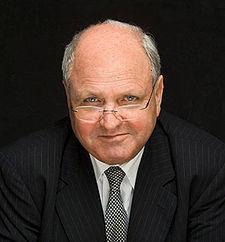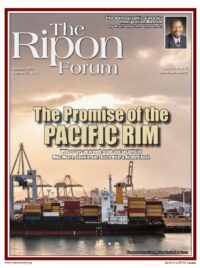
In October of 1838 –175 years ago – an entrepreneur named James Clendon became the first United States Consul to New Zealand. Our two countries have been talking, trading, collaborating and fighting side-by-side ever since.
New Zealanders feel very comfortable here in the United States. We are all just a few generations away from a farm and a boat. We are nations of immigrants. We were all boat people at some time or another, and no one came to New Zealand or the United States without a memory. We feel a common heritage.
Increasingly, our collaboration is taking place in the Asia-Pacific region.
Like others in our region, New Zealand welcomed the U.S. signing the Treaty of Amity and Co-operation, joining the East Asia Summit, and pursuing a constructive diplomacy and engagement with China. How can we be neutral and indifferent, given our interests and values, to encouraging our partners and friends in China to play a leadership role in global affairs commensurate with her history, culture, growth and power?
The relationship between the United States and China is the central and most profound relationship of our age. It will impact everyone, everywhere.
The relationship between the United States and China is the central and most profound relationship of our age.
New Zealand has an excellent and growing relationship with China – it being our second largest trading partner, after Australia. We are proud that New Zealand is the first developed country to have a free trade deal with China, and our experience is positive. We were the first developed nation to agree to China’s conditions to join the WTO, and the first to accord them market economy status. We also have an agreement with Hong Kong and recently concluded an economic cooperation agreement with the economy of Chinese Taipei.
The attitude of the U.S. Government towards China has been positive and constructive. At every level of contact here in Washington, my colleagues speak of engagement with China. No adult talks of containment. The idea of containment misreads the past, misreads the present and misreads the future.
You can no more contain China than you can contain the Atlantic or the Pacific Ocean. It’s a throwback to the Cold War. New Zealand doesn’t fear a strong, growing and prosperous China. And those who claim to fear China’s growth should think about the harm to our economies and our region of a slow growth, fractured and fractious China.
New Zealand sees stability, progress, growth and jobs with a strong China as well as, of course, a strong, confident, growing, engaged United States. We have confidence in the future of the United States and reject those who speak of an American decline.
Let’s look at the facts. The U.S. share of global GDP is just about where it was in the 1970s. Even if military expenditure slows, the United States still will be spending more on defense than the next dozen countries put together. Forty percent of all university spending is here in the United States; thirty of the top fifty universities are in the United States; seventy percent of Nobel Prize winners live in the United States.
We celebrated with the United States your free trade agreements with Korea, Colombia and Panama – passed by massive, bipartisan majorities in Congress. We are excited by the commitment of politicians on both sides of the aisle to the Trans-Pacific Partnership (TPP).
We are excited by the commitment of politicians on both sides of the aisle to the Trans-Pacific Partnership (TPP).
We are ambitious for a high-quality, 21st Century deal. We too want to take the jack-boot of regulations, red tape and compliance costs off enterprise, to speed business and create jobs. We know that it’s small business more than big business that needs predictable, transparent rules of engagement.
This TPP negotiation will not be easy. We know that understandings on intellectual property, State-Owned Enterprises, labor and the environment are a necessity. But to address 21st Century subjects, we also have to finally resolve 20th Century issues. That means taking taxes off imports of agricultural products.
TPP has always been an expansionist model. It started as a free trade agreement between New Zealand and Brunei, Chile and Singapore. Now the group of nations, including such major economies as Japan, Canada and Australia, collectively represent 40 percent of global trade, making it the number one export market for the U.S. Over time, we want other friends to join up to its high ambitions in a second and third tranche of members. In the meantime, we too are anxious not to lose momentum or to lower ambitions. This will require courage, stamina and vision. Boldness is our friend.
Let’s hope we don’t go into deadlock over the definition of catfish, old problems of textiles, sugar or dairy. Let’s concentrate on the future, because the past isn’t all it’s cracked up to be. We are all bigger than this. Among our many mutual domestic problems is the employment of the young – those locked outside, their faces pressed against the window – that worries our leaders the most. For us the future is to be faced, not feared.
Amid the great, contentious debates of our times – and having suffered the worst economic slowdown since the Great Depression – we sometimes forget about what we have achieved in the past half-century. We should celebrate our successes: the great ideas of freedom, representative democracy, the rule of law, property rights, and the virtues of social mobility. We ought not to lose our nerve now when we know that more wealth has been created over the past 60 years than the rest of human history put together. Millions have been lifted out of extreme poverty, and the more open the society the better the outcome.
One of America’s greatest strengths has been its ability to attract the best and brightest from around the world. That includes a vast number of visitors, traders, investors and immigrants from across the Pacific.
People, when given the choice, choose freedom in the polling place and the market space. Even after the greatest economic recession since the Great Depression, we are coming back. Those who predicted the end of democratic capitalism and the exhaustion of social democracy will be disappointed. The trading system did hold. Because we learn from history, we adjust.
One of America’s greatest strengths has been its ability to attract the best and brightest from around the world. That includes a vast number of visitors, traders, investors and immigrants from across the Pacific. Whether it’s to study, to trade and invest, or to make them your own, you’ve managed to gain an intellectual and economic edge from this policy. It’s overwhelmingly in US interests to strike that balance again.
From taking charge of the fleet to combat piracy off Somalia to securing a province in Afghanistan, New Zealanders take our global responsibilities seriously. As always, New Zealand will stand with the forces of reason against the forces of reaction. This is the rent we pay for our way of life. It is the cost of civilisation and always has been. We do so standing proudly with our American friends: facing the Asia-Pacific as partners, working for an ever more prosperous and peaceful region.
The Rt Hon Mike Moore is New Zealand’s Ambassador to the United States.




